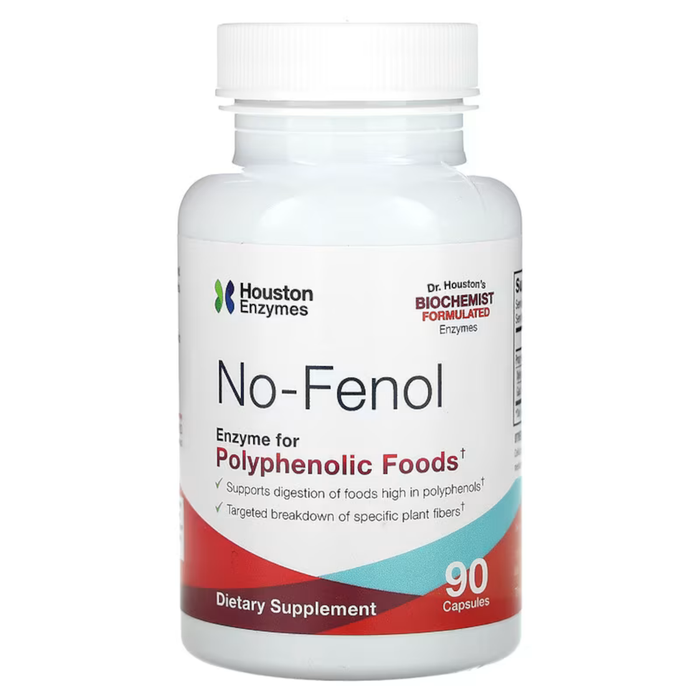
Houston Enzymes No-Fenol - 90 Capsules
- Better breakdown of fruits and vegetables
- Helps support availability of polyphenols from foods
- Partially breaks down fiber during digestion, allowing incorporation into stool†
No-Fenol™️ was developed by Dr. Devin Houston, CEO of Houston Enzymes, in response to requests for a product that would support the digestion of fruits and vegetables, especially those high in polyphenolic compounds.
All plants contain some degree of polyphenolic compounds (sometimes called "phenols"). The polyphenol structure itself is found everywhere in nature, and is essential to many of life's processes. Some individuals have difficulty in the processing of foods high in polyphenolic compounds.
Polyphenols are important compounds used by the gut bacteria.The research literature indicates that some polyphenols, when produced in the plant, are modified by the addition of carbohydrate groups to their structures, which may inhibit their availability for absorption. Enzymes, such as alpha-glucosidases, found in gut bacteria can de-glycosylate (removing the carbohydrate group) the polyphenols which then supports absorption of the compound.
No-Fenol may help digestion by breaking down the fibrous plant cell walls of fruits and vegetable, allowing the polyphenols and other cell nutrients to be released during digestion.
The enzyme xylanase is the major component of No-Fenol, and is an enzyme used to breakdown the structural components of plant cell walls, which are primarily very complex carbohydrates. Xylanase is used in the juice industry to extract more juice from fruit pulp fibers.
Foods rich in polyphenols include:
- brightly colored fruits
- brightly colored vegetables
- red wine
- coffee
- black and green teas
- spices
- dark chocolate
Filler
No-Fenol capsules contains microcrystalline cellulose and medium chain triglyceride (MCT) powder as filler. The MCT is derived from palm or coconut oil, and the cellulose is derived from European Spruce trees.
You may open the No-Fenol capsules and mix with food or drink. Also check out our TriEnza Chewable which has some of the main enzyme from No-Fenol, plus other enzymes for carbs, fats and proteins.
Contraindications for Enzyme Supplementation
This product may not be appropriate for those with known allergies to enzyme proteins, though non-specific mold allergies do not necessarily preclude use of fungal enzymes. Consult your medical doctor for further advice, and err on the side of caution. Those with known anaphylactic allergic reactions to fungal proteins should NOT ingest fungal-derived enzymes.
Please see the Supplement Facts tab for a full listing of the Ingredients in this product. In summary, it contains: Enzyme Blend: Xylanase, Galactomannanase (AN).
Supplement Facts

This product includes the following materials that are either derived from or contain allergens which must be declared on labels per the US Food Allergen Labeling and Consumer Protection Act (FALCPA):
None‡.
The production process used to manufacture the enzymes found in this product utilizes fermentation materials that are derived from or contain the allergens listed below. While these fermentation materials should be either consumed during fermentation or removed from the enzyme during additional enzyme isolation steps, minute traces of these allergens may be left in the final enzyme product. While these traces are expected to be below the limits of detection for standard ELISA based allergen testing methods‡, we cannot guarantee the complete absence of these allergens:
Wheat
‡NOTE: Enzymes and probiotics can interfere with common ELISA based allergen test kits, producing either false positives or false negatives in these tests. When performing allergen testing on enzyme containing products, special sample preparation techniques must be utilized to avoid this interference.
Suggested Use
A dose of 1 capsule usually suffices for most meals, but not necessarily with every meal. Some have found satisfactory results with once or twice per day dosing, indicating that optimal dosing may be dependent upon many factors.

